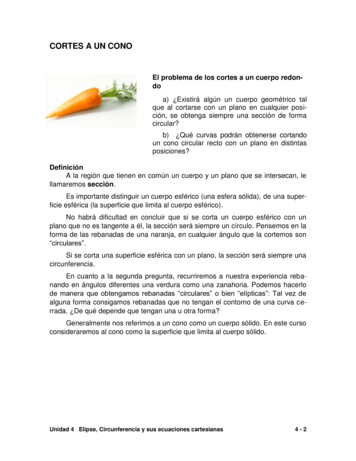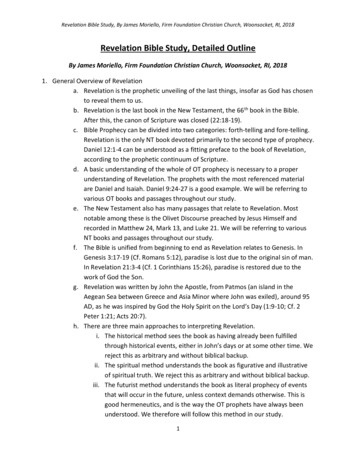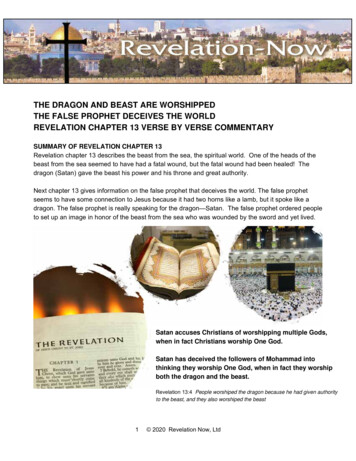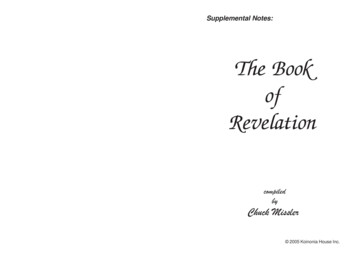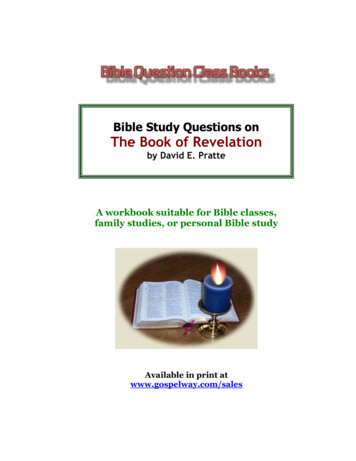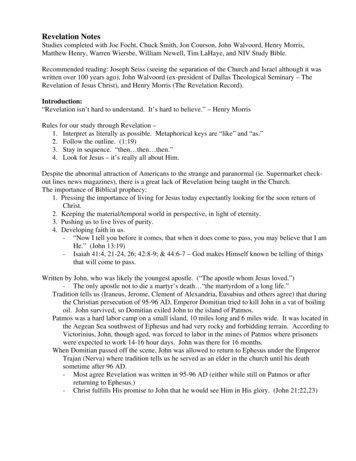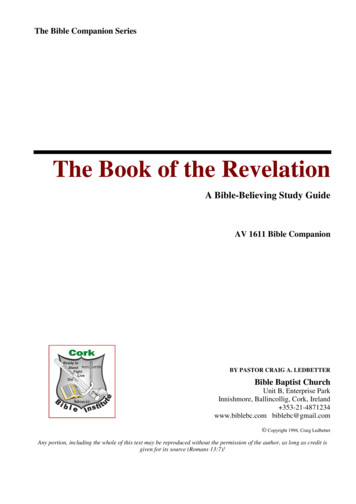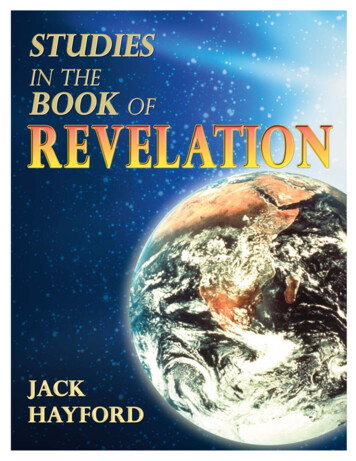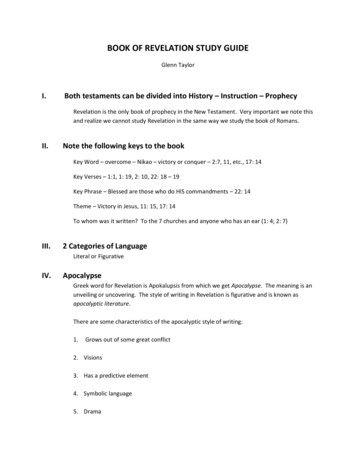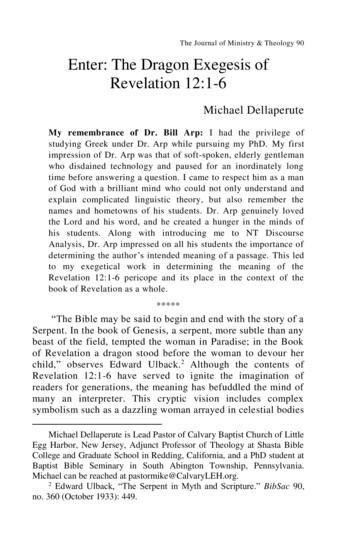
Transcription
Notes onRevelation2 0 2 2 E d i t i o nDr. Thomas L. ConstableWRITERThe opening verses of the book state that John wrote it (1:1, 4, 9; cf.22:8). From the first century to the present day, almost all orthodoxscholars have concluded that this John was the Apostle John.1 Twonoteworthy exceptions were Luther and Zwingli. Today many scholars whoaccept the divine inspiration of the book believe that the Apostle Johnwrote it. Others believe that some other John wrote the book.2 This is duemainly to the fact that the style of Revelation is quite different from thatof John's Gospel and his epistles. This differences, however, may be due inpart to the different genres (types of literature) of these writings.DATESome of the early church fathers (Clement of Alexandria, Eusebius,Irenaeus, and Victorinus) wrote that the Apostle John experienced exile onthe island of Patmos during the Roman Emperor Domitian's reign (1:9).3They wrote that the government allowed John to return to Ephesus afterDomitian's death in A.D. 96. Consequently many conservative interpreters1SeeRobert L. Thomas, Revelation 1—7: An Exegetical Commentary, pp. 2-19; John F.Walvoord, The Revelation of Jesus Christ, pp. 11-14; or Donald A. Carson and Douglas J.Moo, An Introduction to the New Testament, pp. 700-7, for further discussion ofauthorship.2E.g., David E. Aune, Revelation 1—5, p. lvi; William Barclay, The Revelation of John, 1:15;James Moffatt, "The Revelation of St. John the Divine," in The Expositor's GreekTestament, 5:320-27; Buist M. Fanning, Revelation, p. 28.3See the map near my comments on 1:10-11. For a summary of this tradition, see IsbonT. Beckwith The Apocalypse of John, pp. 366-93; George Eldon Ladd, A Commentary onthe Revelation of John, p. 8; and Raymond E. Brown, The Gospel According to John,1:lxxxviii-xcii.Copyright Ó 2022 by Thomas L. Constable
Dr. Constable's Notes on Revelation22022 Editiondate the writing of this book near A.D. 95 or 96.1 There is good evidencethat this was the last of John's inspired writings.2 Kenneth Gentry arguedthat John wrote Revelation in the late 60s.3 Several writers have refutedthis view.4AUTHENTICITY"Perhaps more than any other book in the NT, the Apocalypseenjoyed wide distribution and early recognition."5Where did John get "the revelation" that he wrote down in this book? Hesaid that he received it from Jesus Christ through angelic mediation (1:1).Most of the details of this revelation were undoubtedly new to John.However there are remarkable parallels between this revelation and theLord Jesus' teaching in the Olivet Discourse (Matt. 24—25; Mark 13; Luke21). The Book of Revelation clearly builds on that foundation and expoundsit.6 The apocalyptic (doomsday) sections of certain books of the OldTestament—particularly Daniel, Isaiah, Ezekiel, and Psalms—contain formerrevelation that God gave His prophets about the end times.1E.g.,Carson and Moo, pp. 707-12; Barclay, 1:17; Moffatt, 5:327; A. T. Robertson, WordPictures in the New Testament, 6:274, 343; Robert Jamieson, A. R. Fausset, and DavidBrown, Commentary Practical and Explanatory on the Whole Bible, p. 1531; Arno C.Gaebelein, The Annotated Bible, 4:2:192; Richard C. H. Lenski, The Interpretation of St.John's Revelation, p. 5; John F. Walvoord, "Revelation," in The Bible KnowledgeCommentary: New Testament, p 925; Kenneth G. Hanna, From Gospels to Glory, p. 484.See also Aune, p. lxix.2See Lenski, pp. 6-7.3Kenneth L. Gentry Jr., Before Jerusalem Fell: Dating the Book of Revelation.4E.g., Robert L. Thomas, Evangelical Hermeneutics, pp. 451-71; and Mark L. Hitchcock, "ADefense of the Domitianic Date of the Book of Revelation" (Ph.D. dissertation, DallasTheological Seminary), 2005.5Robert H. Mounce, The Book of Revelation, p. 36.6See Alan Johnson, "Revelation," in Hebrews-Revelation, vol. 12 of The Expositor's BibleCommentary, p. 402; Austin Farrer, The Revelation of St. John the Divine, pp. 31-32;Henry B. Swete, The Apocalypse of St. John, pp. cli-clii; Beckwith, pp. 139-40; and LouisA. Vos, The Synoptic Traditions in the Apocalypse.
2022 EditionDr. Constable's Notes on Revelation3"An apocalypse was the word for a crisis, and for a crisis whichbordered on the end."1CHARACTERISTICSJohn also alluded often to Exodus, Deuteronomy, Jeremiah, and Zechariah.One scholar claimed that 278 of the 404 verses in Revelation containreferences to the Old Testament.2 William Barclay claimed that John quotedor alluded to the Old Testament 245 times, citing about 20 Old Testamentbooks—his favorites being Isaiah, Daniel, Ezekiel, Psalms, Exodus, Jeremiah,and Zechariah.3 The United Bible Society's Greek New Testament lists over500 Old Testament passages that John alluded to.4 Despite all theseallusions, however, there are no formal quotations from the OldTestament.5 The revelation that Jesus gave in the Olivet Discourse andlater to John on Patmos supplements the earlier revelation."Jesus in His [Olivet] discourse was clearly anticipating whatHe was to show John in much greater detail more than sixdecades later here on the island of Patmos."6INTERPRETATIONSThere have been four basic interpretations of Revelation throughout churchhistory.7 Of course, there are additional variations within these four.1Moffatt,5:295. See Hanna, pp. 485-88; and Elliott E. Johnson, "Apocalyptic Genre inLiteral Interpretation," in Essays in Honor of J. Dwight Pentecost, pp. 197-210, fordiscussions of the apocalyptic character of Revelation.2Swete, p. cxxxv.3Barclay, 1:14.4Second edition, pp. 897-920. See Gregory K. Beale, The Book of Revelation, for manyallusions to the Old Testament, and Merrill C. Tenney, Interpreting Revelation, p. 104, forcharts of the distribution of these in the Old Testament.5Fanning's commentary is particularly helpful in identifying Old Testament and extrabiblicalsources.6Thomas, Revelation 1—7, pp. 53-54.7See Wilbur M. Smith, "Revelation," in The Wycliffe Bible Commentary, pp. 1497-1500,for an excellent, slightly longer explanation of these views; or Tenney, pp. 135-46; orHanna, pp. 488-90. See Thomas Ice, "Back to the Future: Keeping the Future in the
4Dr. Constable's Notes on Revelation2022 Edition"The basic hermeneutical problem in Revelation is determiningwhat is symbolic and what is literal.1The idealist, or allegorical, interpretation sees the book as an allegory thatteaches the ideal of the triumph of good over evil. Antichrist, in this view,is not a real person but the personification of evil. In an allegory there is nohistorical basis for the story; it is fiction (cf. Pilgrim's Progress). This viewhas appealed to few interpreters who have a high view of inspiration. Mostof its advocates are quite liberal in their theology, and are mainlypostmillennial or amillennial in their eschatology (study of future things).2The preterist interpretation, after the Latin word preater, meaning past,views the book as dealing only with events in the early history of thechurch, specifically its conflicts with Judaism and paganism in John's day.Advocates often identify Antichrist as a past Roman emperor, but there ismuch difference of opinion about which one. The advocates of this vieware mainly postmillennialists and amillennialists. The main problem with thisview is the inability of its advocates to unite on the identifications of thevarious people and symbols that appear in the book. Also, 1:19 says thatthe book points ahead as well as back, and not just to the present (earlychurch era).3The historicist view understands Revelation to be dealing with events in thetotal history of the church, not just the church until John's day. Manyadvocates identify Antichrist with one of the medieval popes, but they donot agree on which one. Advocates are mainly postmillennialists andamillennialists, though some premillennial commentators also held thisview.4 The main weakness of this view is the interpreters' inability toidentify everything predicted in the book with past events and people.Future," in When the Trumpet Sounds, pp. 13-16, for the historical development of thesefour positions.1Robert Vacendak, "The Revelation of Jesus Christ," in The Grace New TestamentCommentary, 2:1250.2See Tenney, pp. 147-67; or Hanna, pp. 490-92, for discussions of millennial views.3For arguments favoring a preterist-idealist interpretation, see John Noe, "An ExegeticalBasis for a Preterist-Idealist Understanding of the Book of Revelation," Journal of theEvangelical Theological Society 49:4 (December 2006):767-96.4E.g., Jamieson, et. al., p. 1547. See John F. Walvoord, Prophecy, p. 12, for concisedefinitions of these three views.
2022 EditionDr. Constable's Notes on Revelation5The futurist view sees the book describing events that are mainly in theeschatological (end times) future, specifically the things described inchapters 4—22. Antichrist, according to this view, is a person who willappear in the future from our present perspective in history. Advocates ofthis view are mainly premillennialists. The main problem with this view is itsimprobability, at least from the viewpoint of its critics. Another problem isthat it requires more literal interpretation and belief in the supernaturalthan some interpreters are comfortable with. This view makes the mostsense of the book to me. By the way, I am a premillennialist, not because Iam a graduate of Dallas Theological Seminary, but because premillennialinterpretations of various New Testament passages make the most senseto me. In other words, exegesis, rather than theology, is the basis for mypremillennialism. J. Sidlow Baxter claimed to be a futurist interpreter forthe same reason:"I believe the Futurist interpretation to be true because itinterprets the disclosures of John's revelation in parallelcorrespondence with the whole scheme of Biblical prediction."1I have listed these views in order according to the literalness of theadvocates' interpretation of the book, beginning with the least literal. WhenI was studying Hebrew with Dr. Merrill Unger in seminary, someone askedhim in class what he would say to the Lord if, when he got to heaven, hediscovered that amillennialism was true and premillennialism was false. Dr.Unger, who was a premillennialist, facetiously answered that he would say,"I'm sorry, Lord. I just took You at Your word." Many amillennialists admitthat if you interpret the references to Israel in the New Testament asreferences to the physical descendants of Jacob (Israel), you will come outa premillennialist. That is the normal meaning of Israel. They reject thisapproach, however, because they believe that prophecy requires a special(spiritual, really mystical) hermeneutic.2 Charles Hodge, an amillennialist,wrote the following:1J.Sidlow Baxter, Explore the Book, 6:338. See Appendix 1 at the end of these notes fora chart of these views and a list of some expositors and commentators who hold eachone.2For further discussion of the hermeneutics (principles of interpretation) of prophecy, seeCharles C. Ryrie, The Basis of the Premillennial Faith, pp. 34-47; Alva J. McClain, TheGreatness of the Kingdom, pp. 139-45, 519-26; Oswald T. Allis, Prophecy and the Church,pp. 16-54; and Paul L. Tan, The Interpretation of Prophecy.
Dr. Constable's Notes on Revelation62022 Edition" the doctrine of a pre-millennial advent to Christ has beenextensively held from the days of the Apostles to the presenttime."1Still another view deserves brief mention. We might label it the Jewishinterpretation. This view, which was advocated primarily by E. W. Bullingerin The Apocalypse or the Day of the Lord, proposed that nothing inRevelation has been fulfilled yet. The seven churches of Asia (chs. 2—3)have yet to come into existence, and there is nothing but revelationconcerning the Jewish people in the entire book. This view has not foundmany supporters.Some scholars, mainly amillennial, have argued very hard for a differenthermeneutic when we come to interpreting Revelation—even all propheticScripture. They say that literal interpretation yields unbelievable andfantastical results when applied to prophecy. "Wooden literalism" does(e.g., a great dragon trying to devour a woman's child as soon as it is born,then chasing the woman into a wilderness). But normal interpretation yieldsa possible scenario, though it stretches the faith of some. Opponents of aspecial hermeneutic for prophecy say that fulfilled prophecy has beenfulfilled literally (e.g., Jesus' virgin birth in Bethlehem). But for God to befaithful to His Word, there must be a Tribulation, a return of Christ to theearth to reign, a Millennium, and a new heavens and earth in the future. Bythe way, most messianic prophecy deals with Jesus' second advent (i.e.,the entire period of events from the Rapture through the Second Coming),not His first advent.We could compare these four schools of interpretation to four schools ofpainting. The allegorical school of interpretation is similar to the modernistschool of painting. Its advocates believe that the images that God allowedJohn to see have little correspondence to reality, but they serve thepurpose of creating only a general impression in the reader. The preteristschool of interpretation is similar to the abstract school of painting. Thereis somewhat more correspondence to reality, but not much. I wouldcompare the historicist school of interpretation to the impressionist schoolof painting, because the intent of the artist was to convey a mood as wellas a representation of reality, with the mood being dominant.1CharlesHodge, Systematic Theology, 3:861.
2022 EditionDr. Constable's Notes on Revelation7The futurist (or literalist, or normal) school of interpretation is like therealistic school of painting. These interpreters believe that the writer'sintent was to portray his subject as close to reality as possible—almost likea photograph of what he saw. What kind of a picture did John paint for us?Since the book makes sense if viewed as a piece of realism, that isessentially how I believe John wrote it. It does contain many symbols, butthe book itself, and other books of the Bible, help us to interpret thesymbols. So perhaps we should view Revelation as a literal picture withsome concessions to impressionism.Why is there so much symbolism in this book? David Jeremiah offered threereasons: Symbolism is not weakened by time. Symbols impart values andarouse emotions. And symbols can be used as a secret code.1One reason that people have neglected and avoided Revelation is becausethere have been so many different interpretations of it. Most peopleprobably avoid it out of frustration."He [Martin Luther] mistrusted Revelation because of itsobscurity. 'A revelation' said he, 'should be revealing.'"2Some people avoid the book because it has divided Christians. However byapplying the same hermeneutical principles that we use to study the otherBible books, the futurist interpretation makes good sense. Futuristinterpreters are remarkably united on what the book reveals, though theydiffer in interpreting some of the details. The symbolism is drawn frommany previous Bible books. Revelation is similar to an airport, or a railwayterminal, or a weaver's loom, where materials from many other sourcescome together."No one book of Scripture can be understood by itself, anymore than any one part of a tree or member of the body canbe understood without reference to the whole of which it is apart."31DavidJeremiah, Escape the Coming Night, p. 18.H. Bainton, Here I Stand, p. 261.3Hodge, 1:38.2Roland
Dr. Constable's Notes on Revelation82022 EditionGENREThe Book of Revelation contains three types of literature mainly:apocalyptic (cf. Ezek. 1:1-14), prophetic (cf. Isa. 53:1-6), and epistolary(cf. 1 Cor.).1 I think we should view the book as mainly prophetic (cf. 1:3;10:11; 22:7, 10, 18, 19) with some apocalyptic descriptions, and I believethat it was written in the form of a letter.2 The book claims to be arevelation. A revelation reveals something, so we should expect it to becomprehensible and not completely obscure, although there are things inthis Revelation that are difficult to understand. The book makes good senseif interpreted using the same principles of interpretation that we apply tothe rest of the Bible.OUTLINEI.The preparation of the prophet ch. 1A.The prologue of the book 1:1-81.2.3.4.B.The first commission to write 1:9-11The source of the commission 1:12-16The amplification of the commission 1:17-20The letters to the seven churches chs. 2—3A.The letter to the church in Ephesus 2:1-71.2.1Seepreface 1:1-3address and doxology 1:4-6theme 1:7divine confirmation 1:8The commission of the prophet 1:9-201.2.3.II.TheTheTheTheDestination and description of Christ 2:1Commendation 2:2-3Aune, pp. lxxii-xc.Robert L. Thomas, "The New Interpretation of Bible Prophecy," in The GatheringStorm, pp. 27-54, who argued for a totally prophetic genre. Gordon Fee, "The Genre ofNew Testament Literature and Biblical Hermeneutics," in Interpreting the Word of God, pp.123-25, took it as mainly apocalyptic.2Cf.
2022 Edition3.4.5.B.Destination and description of Christ 3:1a-bCommendation and rebuke 3:1c, 2bExhortation 3:2a, 3Promise 3:4-6The letter to the church in Philadelphia 3:7-131.2.3.4.G.Destination and description of Christ 2:18Commendation 2:19Rebuke 2:20-23Exhortation 2:24-25Promise 2:26-29The letter to the church in Sardis 3:1-61.2.3.4.F.Destination and description of Christ 2:12Commendation 2:13Rebuke 2:14-15Exhortation 2:16Promise 2:17The letter to the church in Thyatira 2:18-291.2.3.4.5.E.Destination and description of Christ 2:8Commendation 2:9Exhortation 2:10aPromise 2:10b-11The letter to the church in Pergamum 2:12-171.2.3.4.5.D.Rebuke 2:4Exhortation 2:5-6Promise 2:7The letter to the church in Smyrna 2:8-111.2.3.4.C.Dr. Constable's Notes on RevelationDestination and description of Christ 3:7Commendation 3:8Promise 3:9-11a, 12Exhortation 3:11b, 13The letter to the church in Laodicea 3:14-229
Dr. Constable's Notes on Revelation101.2.3.4.III.2022 EditionDestination and description of Christ 3:14Rebuke 3:15-17Exhortation 3:18-19Promise 3:20-22The revelation of the future 4:1—22:5A.Introduction to the judgments of the Tribulation chs. 4—51.2.B.The first six seal judgments ch. 61.2.3.4.5.6.C.The sealing of 144,000 Israelites 7:1-8The salvation of the great multitude 7:9-17The first four trumpet judgments ch. 8The fifth and sixth trumpet judgments ch. 9Supplementary revelation of John's preparation for recordingthe remaining judgments in the Great Tribulation ch. 101.2.3.F.first seal 6:1-2second seal 6:3-4third seal 6:5-6fourth seal 6:7-8fifth seal 6:9-11sixth seal 6:12-17The first six trumpet judgments chs. 8—91.2.E.TheTheTheTheTheTheSupplementary revelation of salvation in the Great Tribulationch. 71.2.D.The throne in heaven ch. 4The Lamb on the throne ch. 5The appearance of the mighty angel 10:1-4The announcement of the mighty angel 10:5-7The instruction of the mighty angel 10:8-11Supplementary revelation of the two witnesses in the GreatTribulation 11:1-141.The temple in Jerusalem 11:1-2
2022 Edition2.3.4.5.G.H.finalJudgment at the end of the Great Tribulation ch. 14Preparation for the bowl judgments ch. 15The commencement of the bowl judgments 16:1The first bowl 16:2The second bowl 16:3The third bowl 16:4Ascriptions of angelic and martyr praise 16:5-7The fourth bowl 16:8-9The fifth bowl 16:10-11The sixth bowl 16:12-16The seventh bowl 16:17-21Religion in the Great Tribulation ch. 17Commerce in the Great Tribulation ch. 18The Second Coming of Christ ch. 191.2.3.M.theSupplementary revelation of the judgment of ungodly systemsin the Great Tribulation chs. 17—181.2.L.The activity of Satan himself ch. 12The activity of Satan's agents ch. 13The seven bowl judgments ch. 161.2.3.4.5.6.7.8.9.K.ministry of the two witnesses 11:3-6death of the two witnesses 11:7-10resurrection of the two witnesses 11:11-13end of the second woe 11:14Supplementary revelation of preparations forjudgments in the Great Tribulation chs. 14—151.2.J.TheTheTheThe11The seventh trumpet judgment 11:15-19Supplementary revelation of Satan's activity in the GreatTribulation chs. 12—131.2.I.Dr. Constable's Notes on RevelationThe praise of God in heaven 19:1-10The return of Christ to earth 19:11-16The destruction of the wicked on earth 19:17-21The millennial reign of Christ ch. 20
Dr. Constable's Notes on Revelation121.2.3.4.N.binding of Satan 20:1-3resurrection of tribulation martyrs 20:4-6final judgment of Satan 20:7-10judgment of the wicked 20:11-15The eternal state 21:1—22:51.2.3.IV.TheTheTheThe2022 EditionThe vision of the new heaven and earth 21:1John's first vision of the New Jerusalem 21:2-8John's second vision of the New Jerusalem 21:9—22:5The epilogue to the book 22:6-21A.B.C.D.TheTheTheThetestimony of the angel 22:6-7testimony of John 22:8-11testimony of Jesus and John's response 22:12-20final benediction 22:21MESSAGEThe Book of Revelation is one of the most encouraging books in the Biblebecause in it we see Jesus Christ vindicated before the world. Revelation isreally a very simple book. It boils down to this: Jesus wins!"In recording the revelation of Jesus Christ, John wanted toreassure his readers that Jesus Christ controls the course andclimax of history."1The subject of the Book of Revelation is Jesus Christ (1:1). It is an unveiling(a revelation) of Him. What does this book reveal about Christ? It revealsthe person of Jesus Christ, the power of Jesus Christ, and the program ofJesus Christ.2First, it is a revelation of the person of Jesus Christ. It unveils who He isand what He is. This book is the climax of Scriptural Christology (the branchof Christian theology that deals with the person, nature, and role of Christ).1TheNelson Study Bible, p. 2161.2SeeTenney, pp. 117-34, for a study of the Christology of Revelation.
2022 EditionDr. Constable's Notes on Revelation13Notice first what the Book reveals about who Jesus Christ is. Threeemphases in the book clarify His essential being: First, He is the samehuman Jesus who was born on earth at His first coming. He is the sameJesus on whose chest John reclined (1:1, 2, 5). He is a son of man whopossesses a fully human nature (1:13). Moreover, He will always be fullyhuman (22:20). Second, He is also fully divine: one in essence with God theFather (1:12-18; 3:14). He reveals God fully (19:13). He will share thethrone of the universe with the Father eventually (22:1, 3). Third, He is theeternal God (1:8; 21:6; 22:13).Notice next what the book of Revelation reveals about what Jesus Christis. Nine titles give us a fuller appreciation of His place in history. In the pastHe proved to be the Root of David, the Lion of the tribe of Judah, and thepromised Messiah (3:7; 5:5; 22:16). This became clear at His baptism(Matt. 3:17). In the past, also at His first advent, He proved to be the Lambof God who takes away the sins of the world (5:6, 12-13; 6:1). This becameclear at His death. In the past He proved to be the firstborn from the dead,the victor over death and Hades (1:5-6, 18; 2:8; 3:21). This became clearat His resurrection. In the present He is the Lord of the churches who reignsover the church (2:1; 3:1; cf. 22:20).In the future Jesus Christ will prove to be the Judge of all humankind (2:12,18; 3:14; 6:1; et al.). This is His primary role during the Great Tribulation.In the future He will prove to be King of kings and Lord of lords (1:5; 17:14;19:16). This is His primary role during the Millennium. In the future He willprove to be the Morning Star (22:16; cf. 2:28). His Second Coming willsignal the dawning of a new day in history. This will find its clearestrevelation in the new heavens and new earth. The Millennium will only be aforetaste of that eternal day.This book is also a revelation of the power of Jesus Christ. Individuals havevarious kinds of power. Jesus Christ has all kinds of power, and all (total)power of all kinds.First, He has all personal power. He has inherent power, power withinHimself. We see this in His control of all other beings and forces (e.g.,believers, unbelievers, Satan, the beasts, human armies, etc.). He wieldsthe power Himself. He also has acquired power, power that has been givento Him by another. His Father has given Him even more power and authoritythan He had before his incarnation (5:1, 6-7; cf. Matt. 28:18). He exercisesall the power of the Godhead.
14Dr. Constable's Notes on Revelation2022 EditionSecond, He has all instrumental power. That is, He has authority over allthings as He executes His power. All things are His instruments or tools. Hehas power over all material objects and forces. He controls the physicaluniverse. We can see this in His using individuals, storms, earthquakes, andeven the heavenly bodies to accomplish His will in this book. He also haspower over all spiritual entities and authorities. He controls the angels, thedemons, and Satan. Every power in the universe is under His authority andcontrol (e.g., 13:15).Third, He has all effectual power. That is, He has power to accomplishanything. He can affect any changes that He desires. He has all destructivepower. He can destroy anything that exists: individuals, systems (e.g.,Babylonianism), objects, even the very heavens and earth. He also has allconstructive power. He can create new human bodies (by resurrection),new systems (new religious and economic orders), and new cities (the newJerusalem). He will even create new heavens and a new earth.The Book of Revelation also reveals the program of Jesus Christ (1:19). Itgives us much detail about God's program and how it will unfold in thefuture. However here I will point out God's purposes that this programunveils.Christ's immediate purpose is to defeat and destroy Satan and sin. We seeHim doing this in the Church Age in Revelation as He deals with believers inthe seven churches (chs. 2—3). His purpose is to purify to Himself a peoplewho will be a kingdom and priests to God (1:6). We also see Him doing thisin the Tribulation period in Revelation. We see it in His judgment of thosewho have not believed in Him (chs. 4—18). His purpose is to pour out God'swrath on His enemies for their refusal to receive His grace (16:1). Whydoes there have to be a Tribulation? God has promised a time of troublethat will be the worst that the world has ever seen (Jer. 30:7; Dan. 11:3645). If God is faithful to His promises—and He is—there has to be a specialtime of tribulation yet future.Christ's ultimate purpose is to dwell among His people and experienceintimate fellowship with them. We see Him doing this in the Millennium toan extent never before attained in human history (20:6). We see Him doingthis perfectly and eternally in the new earth (22:3-5). This has always beenGod's ultimate purpose. He will achieve it completely in the new earth.
2022 EditionDr. Constable's Notes on Revelation15The Book of Revelation then is an unveiling of Jesus Christ: His person, Hispower, and His program—for the rest of history. This is the messagestatement. We must never forget that He is the subject of this book as weseek to understand what He has revealed here.1"This is pre-eminently a book for a troubled age, for an age inwhich the darkness deepens, fear spreads over all mankind, andmonstrous powers, godless and evil, appear on the stage ofhistory (as they appear in this book)."21Adaptedfrom G. Campbell Morgan, Living Messages of the Books of the Bible, 2:2:21126.2Smith, p. 1492.
Dr. Constable's Notes on Revelation16I.2022 EditionTHE PREPARATION OF THE PROPHET CH. 1The first chapter of Revelation contains a prologue to the book that issimilar to the ones in John 1:1-18, the prologue to John's Gospel, and 1John 1:1-4, the prologue to John's first epistle. It also relates a vision thatGod gave to John that prepared him for what follows. This prologue hasthe effect of showing that Jesus Christ is the culminating figure in humanhistory (cf. Heb. 1), and it prepares the reader for the revelation of Hisfuture acts that constitute the bulk of this book.A.THE PROLOGUE OF THE BOOK 1:1-8John's prologue in Revelation contains a preface, an address and doxology,and a statement of the book's theme.1.The preface 1:1-3The Apostle John wrote these opening verses of chapter 1 in order tointroduce the book's main subject and His purpose for writing the book. Insimilar fashion, John explained his purposes in writing 1 John (1 John 1:14) and his Gospel (John 20:30-31).1:11Quotations"The revelation of Jesus Christ" is the subject of this book.1Revelation (from the Latin revelatio) means unveiling ordisclosure, and it is a translation of the Greek word apokalypsis,the transliteration of which is an alternative title for the book,namely, "The Apocalypse" (cf. Dan. 2:28-30, 45-47). TheGreek word occurs only here in the book. Jesus Christ was thegiver of this revelation (cf. Matt. 11:27; John 1:18; 5:19-23;12:49; 17:8).2 He is also its main subject.3 That Jesus couldbe both the giver of the revelation and the main subject of therevelation is consistent with the genitive case in the Greekfrom the English Bible in these notes are from the New American StandardBible (NASB), 2020 edition, unless otherwise indicated.2Henry Alford, The Greek Testament, 4:544.3Morgan, 2:2:215.
2022 EditionDr. Constable's Notes on Revelation17text, which should probably be understood as both objectiveand subjective here.Communicated (Gr. esemanen) simply means indicated (cf.John 12:33; Acts 11:28). It does not mean signified in thesense that everything that follows is symbolic, though muchof what Jesus communicated is symbolic.1 Whereas theGospels reveal Jesus in His humiliation, the Book of Revelationreveals Him in His glory."It will be vain to become occupied with 'sevens,''hundred-forty-four-thousands,' 'six-sixty-sixes,'the restoration of the Roman Empire, the personof the antichrist, the two wild beasts, the'millennium,' or even the new Jerusalem; unless,alon
2 Dr. Constable's Notes on Revelation 2021 Edition was the last of John's inspired writings.1 Kenneth Gentry argued that John wrote Revelation in the late 60s.2 Several writers have refuted this preterist view.3 "P
